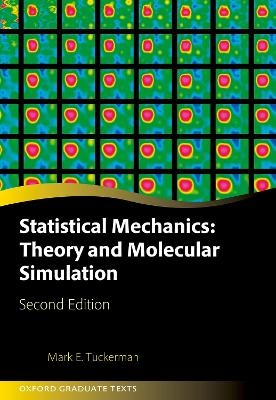
Statistical Mechanics: Theory and Molecular Simulation
Oxford University Press (Verlag)
978-0-19-882556-2 (ISBN)
Scientists are increasingly finding themselves engaged in research problems that cross the traditional disciplinary lines of physics, chemistry, biology, materials science, and engineering. Because of its broad scope, statistical mechanics is an essential tool for students and more experienced researchers planning to become active in such an interdisciplinary research environment. Powerful computational methods that are based in statistical mechanics allow complex systems to be studied at an unprecedented level of detail.
This book synthesizes the underlying theory of statistical mechanics with the computational techniques and algorithms used to solve real-world problems and provides readers with a solid foundation in topics that reflect the modern landscape of statistical mechanics.
Topics covered include detailed reviews of classical and quantum mechanics, in-depth discussions of the equilibrium ensembles and the use of molecular dynamics and Monte Carlo to sample classical and quantum ensemble distributions, Feynman path integrals, classical and quantum linear-response theory, nonequilibrium molecular dynamics, the Langevin and generalized Langevin equations, critical phenomena, techniques for free energy calculations, machine learning models, and the use of these models in statistical mechanics applications. The book is structured such that the theoretical underpinnings of each topic are covered side by side with computational methods used for practical implementation of the theoretical concepts.
Mark E. Tuckerman obtained his B.S. in Physics from UC Berkeley in 1986 and his Ph.D. in Physics from Columbia University in 1993. From 1993-1994, he held a postdoctoral position at the IBM Research Laboratory in Zürich, Switzerland, followed by an NSF postdoctoral fellowship in Advanced Scientific Computing at the University of Pennsylvania from 1995-1996. In 1997 he joined the faculty of New York University, where he is currently Professor of Chemistry and Mathematics. Honors and awards include the Friedrich Wilhelm Bessel Research Award from the Alexander von Humboldt Foundation and the Camille Dreyfus Teacher-Scholar Award. He became a Fellow of the AAAS in 2022.
1: Classical mechanics
2: Theoretical foundations of classical statistical mechanics
3: The microcanonical ensemble and introduction to molecular dynamics
4: The canonical ensemble
5: The isobaric ensembles
6: The grand canonical ensemble
7: Monte Carlo
8: Free-energy calculations
9: Quantum mechanics
10: Quantum ensembles and the density matrix
11: The quantum ideal gases: Fermi-Dirac and Bose-Einstein statistics
12: The Feynman path integral
13: Classical time-dependent statistical mechanics
14: Quantum time-dependent statistical mechanics
15: The Langevin and generalized Langevin equations
16: Discrete models and critical phenomena
17: Introduction to machine learning in statistical mechanics
Free
| Erscheinungsdatum | 03.08.2023 |
|---|---|
| Reihe/Serie | Oxford Graduate Texts |
| Zusatzinfo | 168 line drawings and halftones |
| Verlagsort | Oxford |
| Sprache | englisch |
| Maße | 175 x 252 mm |
| Gewicht | 1814 g |
| Themenwelt | Naturwissenschaften ► Chemie ► Physikalische Chemie |
| Naturwissenschaften ► Physik / Astronomie ► Festkörperphysik | |
| Naturwissenschaften ► Physik / Astronomie ► Thermodynamik | |
| ISBN-10 | 0-19-882556-0 / 0198825560 |
| ISBN-13 | 978-0-19-882556-2 / 9780198825562 |
| Zustand | Neuware |
| Haben Sie eine Frage zum Produkt? |
aus dem Bereich


